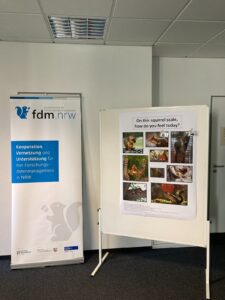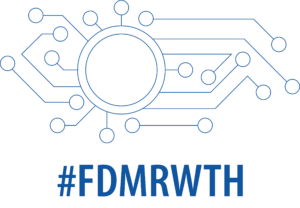
Source: fdm.nrw
From June 14-16, 2023, the Coscine team participated in the RDM workshop hosted by Landesinitiative fdm.nrw in Essen. The RDM workshop offered the opportunity to try out different tools, including Coscine. In different sessions, special functions of the individual tools were presented, which could be tried out by the participants during or afterwards. In addition, the workshop was an optimal opportunity to exchange information about the respective tools and to network. (*)
Ice-Breaker Event
Already on Wednesday evening, the participants had the opportunity to exchange ideas at a joint meeting with buffet and drinks starting at 6pm. The ice-breaker event marked the beginning of the exciting workshop, which dealt with various topics related to research data management. The joint kick-off event served as an opportunity to get to know each other, network, and create a friendly and collaborative atmosphere for the rest of the program.
Let’s go
On Thursday, all participants had the opportunity to spontaneously decide on different sessions. Two sessions were offered in the morning and two in the afternoon.
9am to 1pm: Using DataLad to interface RDM Infrastructures
This session focused on using DataLad, a powerful data management tool, to interact with various RDM infrastructures. Participants learned how to effectively integrate DataLad into their workflow to enable seamless collaboration and version control for their research data. This session aimed to deepen the participants’ understanding of DataLad’s capabilities and its potential to support efficient data management practices.
9am to 1pm: Data Quality Assurance and Detection using GitLab CI/CD
During this session, the participants dove into the topic of data quality assurance using GitLab CI/CD (Continuous Integration/Continuous Deployment). They explored how to set up automated tests and checks within the GitLab environment to ensure data integrity and reliability. This session provided valuable insights into maintaining high-quality data throughout the research process.
Between 1pm and 2pm, participants were able to enjoy their break with food and drink.
2pm to 6pm: Connect DataLad to Coscine Resources
In this session, participants will learn to create a connection between DataLad and Coscine resources. By integrating DataLad with Coscine, researchers can harness the power of both tools to efficiently manage and analyze their data. This session presented best practices and demonstrated the benefits of combining GitLab and Coscine for effective research data management.
2pm to 6pm: Coffee Bean Project – Best Practice Example for combined use of GitLab and Coscine
Using the coffee bean project as a best practice example, the session provided participants with insights into the combined use of GitLab and Coscine. The coffee bean project served as a case study and demonstrated how these tools can be used to streamline research processes, collaborate effectively, and increase overall productivity. Participants in this session tinkered together on ideas around linking GitLab and Coscine and learned a great deal about the possibilities of the two tools as a result.
Final sprint
Also on Friday, participants came together for different topics and sessions. On this day, participants could choose between two sessions from 9am to 1pm.
9am to 1pm: With Metadata to better data! (Meta)data transfer from and to Coscine
This session focused on the importance of metadata for improving data quality in research. Participants were able to explore techniques for transferring metadata to and from the Coscine platform. Effective metadata management enables data discovery, reuse, and interoperability. Participants gained insights into metadata standards, best practices, and tools that can improve their data management.
9am to 1pm: One Tool to rule them all: Research (Data) Management with Emacs
During this session, participants discovered Emacs, a versatile text editor with powerful features for managing research data. The session covered various Emacs functionalities, including organizing data, scripting, and integrating with other tools. Participants learned how Emacs can serve as a comprehensive tool for effective data management.
1pm: Exchange over lunch
The lunch exchange marked the end of the program. Participants had the opportunity to reflect on what they learned from the sessions and engage in a discussion about the key insights. The sessions were intended to foster a sense of community among participants and provide a platform for sharing experiences and future collaboration opportunities.
Feedback on Coscine
Across the sessions, the participants demonstrated a strong motivation to use Coscine for their data needs. They recognized the value of the platform in storing data as well as in implementing FAIR principles that are critical to science. In addition, participants appreciated the ability to effectively link metadata to maximize the value and meaning of their data. Some participants already had positive experiences with Coscine and saw the opportunity to build on their knowledge and skills, while others were encountering the platform for the first time and were curious about opportunities within Coscine.
While using Coscine, participants encountered several challenges. One widespread difficulty was developing a comprehensive understanding of Coscine’s various features and capabilities. In particular, it was unclear to participants who had access to storage and the specific benefits of the various options, such as the differences between S3 and GitLab. In addition, application profiling and a general understanding of it was a hurdle to overcome. Some participants also reported difficulties integrating Coscine with GitLab, particularly with regard to the use of tokens. Feedback from participants proved to be extremely helpful and was gratefully received. The Coscine team is working to address and implement the suggestions for improvement as soon as possible.
Conclusion
Overall, the sessions offered a diverse range of topics and practical examples on research data management. Participants gained valuable knowledge, practical skills, and insights into effective strategies for managing research data throughout the research lifecycle, and look forward to another RDM workshop in 2024.
Learn more
Don’t want to miss any more news about Coscine? Then subscribe to our mailing list and visit us on our website. You can find comprehensive instructions on how to use Coscine in our documentation.
Do you have questions or feedback about Coscine or RDM in general? Then send a message to the IT-ServiceDesk. We look forward to hearing from you!
_______
Responsible for the content of this article is Arlinda Ujkani.





Leave a Reply
You must be logged in to post a comment.